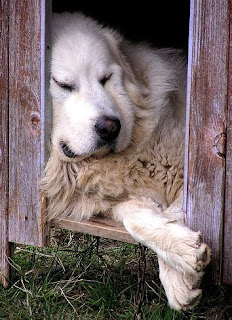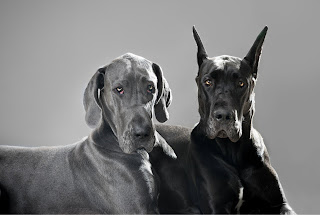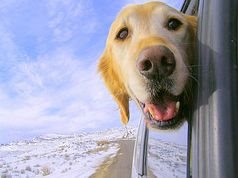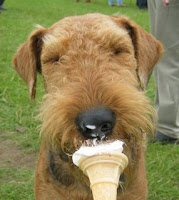Dog blog 12 - work
 Work
Work
Until he gets that sponsorship deal from Pedigree Chum, the Dog, like most Dogs, has to leave his squeaky toys behind every weekday morning (see Dog blog 10 - plugging in).
And get out of his cosy dog bed. And go to work.
Now the Dog mostly enjoys his work. And that is a lucky thing: lots of Dogs would rather be doing something else, like chasing rabbits or chewing one of those chewy bone things that Pedigree Chum make.
Jostling
But there can be frustrations with it.
These stem, I think, from the effort of the politics of work. Trying to make yourself heard; trying to influence and increase your influence; trying to curb others' influence over you: there's always a certain amount of jostling for position.
That got me to wondering: what exactly is being jostled when we're doing all that jostling? Which then got me to thinking about memetics.
Memetics
Memetics is a fairly recent way of thinking about the evolution of culture. It's drawn from evolutionary biology, and began in 1976 when Richard Dawkins suggested the idea in his book The Selfish Gene.
Biological evolution
So I can explain memetics, let's start with a very rough Dog's guide to evolutionary biology.
The basic building blocks of life are called genes. They're bundled into packages called chromosomes and are made of DNA (which looks like two really long chew toys wrapped and wrapped round one another). Genes contain the instruction manuals for putting together the various bits and pieces of an organism. Like a tail or a nice wet nose. Individual genes instruct tiny, tiny bits of the overall job - like eye colour for example.
The entire genetic instruction manual for putting an organism together (like a Dog) is known as the genome.
With me so far? So far so good.
So how does biological evolution happen? Broadly, the main theory is that genes try to get replicated. And, they also mutate (that is, vary) over time when they manage to do that. If particular mutated genes have an advantage over other variations, they will be more likely to get selected for replication than the less advantageous ones.
This theory is evolving itself, and not everyone agrees about it: see for example Rowan Hooper's article in the New Scientist.
All very tricky stuff. Especially for Dogs.
Cultural evolution
So now to cultural evolution.
One of the ideas in Richard Dawkins's book The Selfish Gene is that our culture (e.g. ideas, language, religion, music, fashion) is adaptive and evolves similarly to biological processes.
The Blues
Take for example, the evolution of Blues music during the 20th Century. Here's Robert Johnson, playing Sweet Home Chicago in Texas, around 1936:
And here's Buddy Guy, Robert Cray and Eric Clapton playing the same song, also in Texas, in 2004:
Now that's good geetar from all concerned.
Memetics
In The Selfish Gene, Richard coined the term meme to describe the units of culture that could be likened to genes. One of the memes in Robert Johnson's song might be his Blues guitar riffs. Other examples of memes might be ideas, words, phrases and fashions.
Like genes, these units of culture, these memes, try to survive through replication - through recordings, through books, through language. And, as Buddy, Robert C and Eric were doing with Robert J's song, through performance. And, like genes, memes can vary (i.e. mutate) when replicated.
Richard Dawkins's idea of memes has itself evolved over the years. It's now an area of study in its own right, called memetics. Susan Blackmore is one its strongest advocates. Here's Susan at work:
Interestingly, I discovered that Susan's partner is Adam Hart-Davis who often does fab presentations on his bicycle about history and inventions. And, Adam is a member of many weird and wonderful societies, including the British Toilet Association.
I wonder if there's any connection between the BTA and the several photographs of toilets which appear in Susan's presentation? Are there memes lurking there too?
Replicators and selection criteria
Memes replicate in many ways. For example, through books, clothes, writing, the internet, television, language and Dog blogs.
Some memes can mutate rapidly. Others are slower to do so, and may even be reinforced against change - to avoid mutating out of all recognition. Religion is usually given as an example of having slow-to-adapt memes.
Religion is an interesting case, and makes me wonder more generally what selection criteria pick out particular memes for replication over others? Presumably some of the selection (and creation) of memes has to do with our hardwiring? The language of nature/nurture in biology applied to culture?
Cargo cults
The South Pacific cargo cults for example started without any "cross-fertilisation" from other cults. They arose independently, on different geographical locations. And apparently without awareness of one other. Here's an example of them at work:
Another cult worth looking into is the cult of John Frum:
Identity
We participate in the evolution of culture, and act as replicators for the cultural genome (a memenome?):
- We participate through the songs we like and listen to, the books we read, the television we watch, the choice of words we use and the clothes we like to wear.
- We replicate and mutate culture by making a bit of it our own, by contributing something of ourselves too. And in picking and choosing from the memepool (or memeplexes) - i.e. our selection of memes - we do so partly as a result of our hardwiring (i.e. nature) and partly as a result of a complex feedback relationship with our society (i.e. nurture).
And I think an important part of that participation - i.e. one of the reasons we do it in the first place - is because it contributes to our sense of identity.
Work
Getting back to work, and jostling for position.
Work is very much part of our culture too. And very much contributes to our sense of identity. How many social occasions have you been to and been introduced to someone, and not asked - or been asked - "what do you do"?
Jostling
So, why jostle? Why try to make yourself heard, try to influence others, or try to curb others' influences over you? Why participate in the politics of work?
Is it just about replicating our genes?
I think there is something separate going on to genetic power play. Something more than genetic survival, something more than trying to produce offspring.
Now, we almost certainly have evolutionary hardwiring by-products of our decision tens of thousands of years ago to organise ourselves in groups. As Mark Rowlands says in The Philosopher in the Wolf, it's extremely difficult to stop playing politics of the ape: jostling is in our nature.
What about replicating our memes?
But I think work politics, like culture more generally, is more than just about replicating our genes.
Part of the hardwiring our memes try to latch onto for replication is, I think, our sense of self, our sense of identity. The more closely a meme is associated with you, if someone attacks it or tries to make it their own, or adapts it way beyond what made it your idea in the first place, that person also affects your identity.
And so, there is a built-in drive to to help our memes survive too.
I think this explains some of the power play and politics we see at work. The jostling for position we see is, partly at least, our memes jostling to be replicated. Which doesn't make the jostling at work seem quite so frustrating.
A final thought before I go for my walk: if we become aware of the memetic process happening at work, and work politics becomes less frustrating because of that, does that weaken a meme's chance of replication - and so survival? And, if it does, does a meme's demise still affect your identity to the same degree?
Tricky.



Comments
Post a Comment